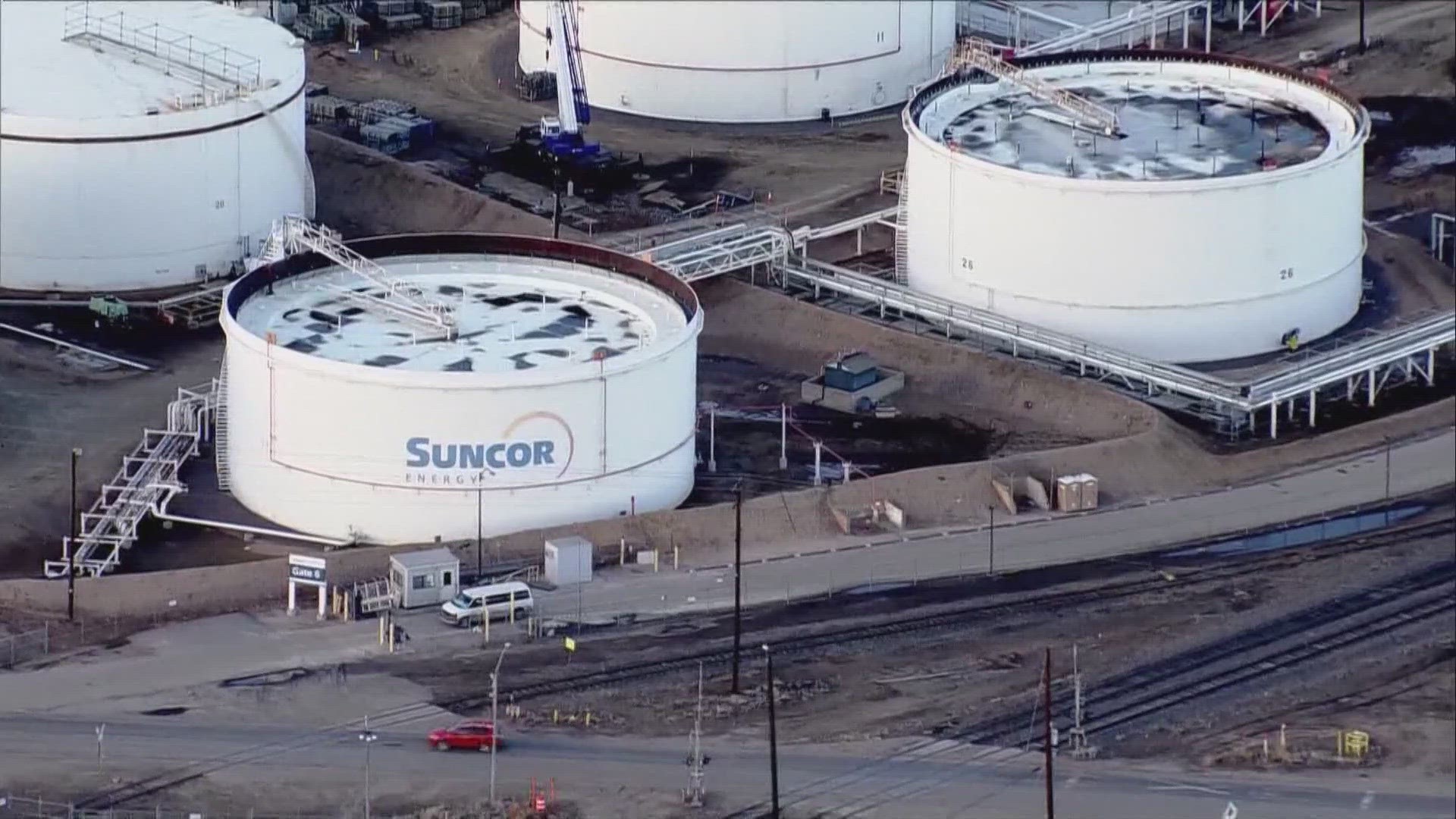COMMERCE CITY, Colo. — Suncor is officially firing back.
A new lawsuit filed by the company against the Colorado Department of Public Health and Environment (CDPHE) is seeking to halt the stricter requirements as detailed out in their most recent water quality permit.
According to a lawsuit filed earlier this week, the company asserted that the new requirements for their water discharge permit as unnecessary and unlawful. Introduced March 6, the 82-page document is the most protective water quality permit Colorado has issued for Suncor.
"Suncor supports many of terms and conditions in the renewal permit that are reasoned, fact-driven requirements designed to 'achieve the maximum practical degree of water quality in the waters of the state consistent with the welfare of the state'", the company said in the 35-page lawsuit.
"However, the renewal permit contains numerous terms and conditions that are arbitrary, capricious, unlawful, unsupported by the record, and unnecessary to protect water quality, including permit conditions that were not in the draft permit and had not been addressed in public comments," Suncor argued.
Suncor is taking issue with nearly a dozen of the state's new requirements, including one that requires the company to reduce salt levels in runoff. They claimed that to meet such a standard, it'll cost them between $191 million to $286.5 million dollars to get the necessary equipment.
They also oppose a number of other issues, from having to conduct inspections of the Burlington Ditch to meeting Colorado's arsenic standard, along with stricter requirements for additional monitoring.
When 9NEWS reached out for comment, CDPHE had this to say:
"We are aware of the lawsuit. We drafted the most stringent water permit in Suncor’s history and are committed to protecting our waterways. Our permitting process included substantial stakeholder outreach, and we worked with numerous community organizations as we crafted the permit."
Suncor provided this statement to 9NEWS:
"While we support reasonable and feasible improvements to our water permit grounded in appropriate data, good science, and Colorado law, there are certain new permit terms that are unreasonable, impractical, and have no appreciable benefit to water quality or the environment.
As we work to resolve these concerns through the appeals process and engaging collaboratively with CDPHE, we will progress with implementing aspects of the new permit. Suncor is not challenging the permit’s new more stringent PFAS limits, and will be developing a new permanent PFAS treatment system.
Additionally, we are already working hard to reduce potential impacts on the environment. Including, since October 2021, CCR has been voluntarily treating the water it discharges to Sand Creek for PFOA and PFOS through a temporary system. We also replaced the Refinery’s underground barrier wall and built a second, parallel barrier wall. Prior to these improvements, in 2017 we commissioned a $65-million upgrade to our existing wastewater treatment facility. This upgrade leverages a unique technology called membrane ultrafiltration to treat and filter the water. Our facility is one of the first in North America to use this technology in treating refinery wastewater streams."
A more restrictive permit
The new permit, which takes effect May 1, 2024, has some significant changes to help protect drinking water.
For the first time, the state said Suncor will have a limit on the amount of PFAS or "forever chemicals," that it can release into Sand Creek. The state hopes the new guidelines will help reduce public exposure. PFAs have been linked in the past to cancer, birth defects, and other issues. The reason why they are known as "forever chemicals" is because they don't break down and can carry on in water and soil indefinitely.
The permit also requires Suncor to conduct groundwater studies twice a month and after each rainfall/snowfall event in the Burlington Ditch, which runs through the company's property in Commerce City.
The permit also requires Suncor to limit releases of other toxic chemicals, such as benzene and arsenic, and send text notifications whenever spills occur.
A troubled past
9NEWS has reported on a multitude of issues with the Commerce City plant. Earlier this year, Suncor was hit with at least $10.5 million in fines for air pollution violations dating back to 2019, making it the largest settlement ever in the state.
Separately, Suncor has also since agreed to double the number of air quality monitoring devices around the edge of the refinery. According to CDPHE, such an action will ensure more data and transparency in air pollution monitoring around the facility.
SUGGESTED VIDEOS: Latest from 9NEWS

